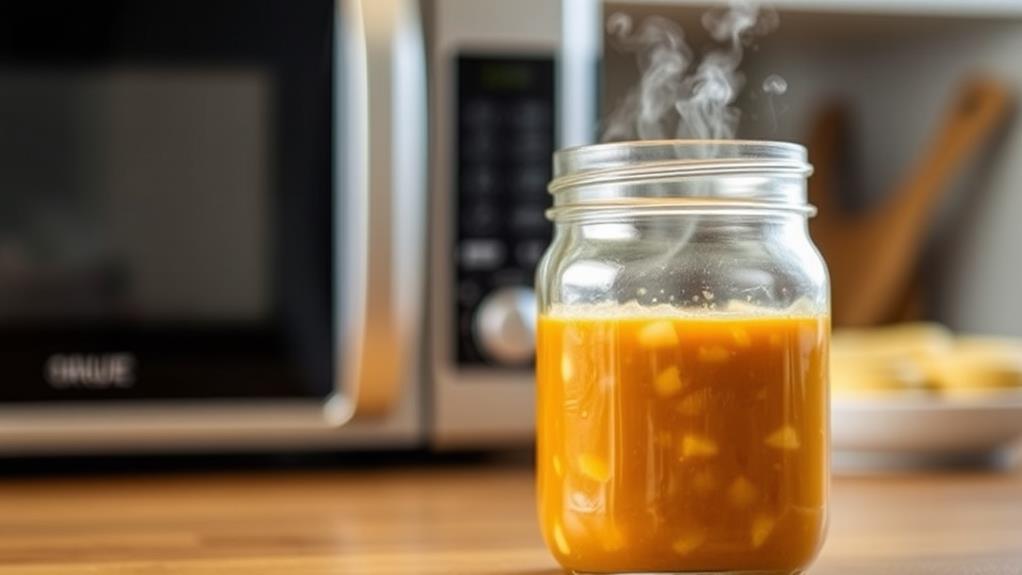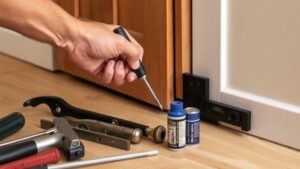Mason jars can be tricky when it comes to the microwave. Many older jars are made from annealed glass, which isn't microwave-safe. If you have newer jars, look for a microwave-safe symbol to be sure. Always remove metal lids before microwaving to avoid hazards like sparks. Remember, even microwave-safe jars can shatter if heated for too long or if they contain very hot liquids. It's best to limit heating time and cover jars loosely to let steam escape. There's more you'll want to know to keep your cooking safe and efficient.
Understanding Microwave Safety
When it comes to microwave safety, understanding the types of Mason jars you're using is crucial. Most Mason jars, especially older models, are made from annealed glass, which isn't microwave-safe. If you heat in Mason jars that aren't designed for the microwave, you risk them shattering due to rapid temperature changes.
On the other hand, newer Mason jars often come with a microwave-safe symbol, indicating they can handle microwave heating, but you should still exercise caution. Additionally, using sustainable materials, such as eco-friendly brands, can also enhance your kitchen experience by promoting healthier cooking practices.
Always remember to remove metal lids and bands before microwaving. These can become hazardous and trap steam, leading to dangerous pressure build-up. To safely heat your contents, loosely cover the jars to allow steam to escape.
Keep an eye on the heating time, as prolonged exposure—even in microwave-safe jars—can damage the glass or cause shattering.
To guarantee you're following best practices, always check the manufacturer's instructions for the specific jars you own. By doing this, you'll enhance your safety and enjoy the convenience of using Mason jars in the microwave without worry.
Identifying Microwave-Safe Jars
Identifying microwave-safe Mason jars is essential for safe cooking. Start by checking for a microwave-safe symbol on newer jars; this indicates they're designed to withstand microwave heating. If you don't see the symbol, it's best to err on the side of caution and avoid microwaving them.
For effective payment alerts and reminders, verify you have a system in place to manage your kitchen time efficiently.
Before using Mason jars in the microwave, always remove metal lids and bands. Keeping them on can lead to heat-related damage and pose hazards.
When you're ready to microwave, cover the jars loosely with a microwave-safe lid or a paper towel. This allows steam to escape and reduces the risk of pressure build-up.
Mason jars should only be used for quick-heat purposes, so avoid long heating periods to prevent glass damage or shattering. Keep an eye on the heating time, and stir the contents halfway through to promote even warmth. This will help verify that your food heats up without any issues.
Risks of Microwaving Mason Jars
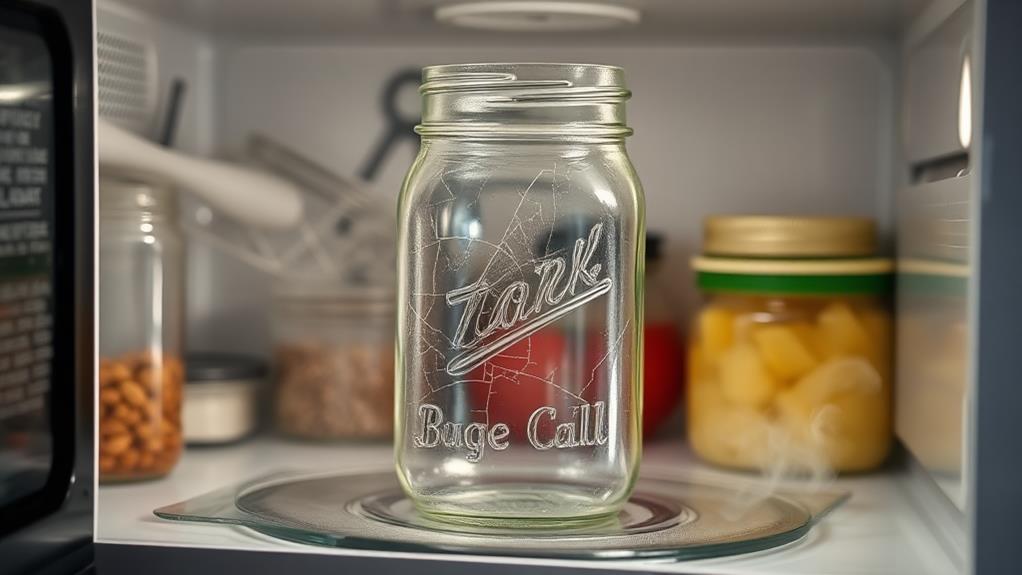
Microwaving Mason jars poses several risks that can lead to dangerous situations. Most Mason jars, including popular brands like Ball®, aren't microwave-safe due to their annealed glass construction, which increases the likelihood that the glass may crack under heat.
In addition, while many consumers are increasingly turning to sustainable and ethical shopping, it's important to be aware that not all kitchenware is created equal regarding safety. Rapid temperature changes can cause the glass to shatter, and the uneven heating often found in microwaves heightens this risk even further.
Another significant concern is superheating liquids in Mason jars. This can lead to explosive boiling, which can create dangerous pressure buildup if the jar is sealed. If you don't vent the jar properly, it could explode, causing injury or damage.
Always remember to remove metal lids and bands before microwaving to avoid additional hazards.
Even jars labeled as microwave-safe can still pose risks. They can become extremely hot during heating, making them tough to handle safely afterward.
To avoid potential injuries or kitchen disasters, it's essential to weigh these risks carefully before deciding to microwave your Mason jars. Always prioritize safety to guarantee a worry-free cooking experience.
Best Practices for Microwaving
To guarantee safe and effective microwaving of Mason jars, it's crucial to follow a few best practices that minimize risks. First, always check for a microwave-safe symbol on newer Mason jars. This guarantees they can withstand microwave heating without breaking.
Before microwaving, remove metal lids and bands, as they aren't microwave-safe and can cause sparks or fires. Additionally, consider using jars that prioritize sustainable packaging solutions, as these practices contribute to a healthier environment and reduce waste ethical and eco-friendly retailers.
Limit your microwave heating time to under five minutes. This reduces the risk of glass shattering from prolonged exposure to high temperatures. When heating, cover the jars loosely with a microwave-safe lid or a paper towel. This allows steam to escape and prevents pressure buildup, which can be dangerous.
Additionally, stir the contents halfway through the heating process. This promotes even warming and reduces the risk of superheating, which can lead to explosive boiling.
Alternatives to Microwaving
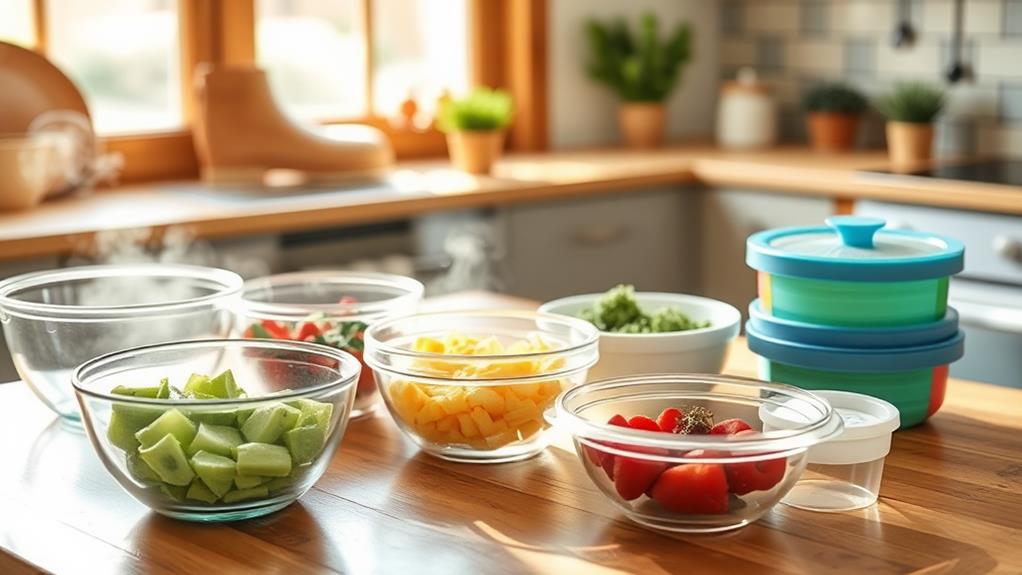
If you're looking for safer ways to heat food, consider alternatives to using Mason jars in the microwave. While these jars are popular for storage, they aren't always microwave-safe. Instead, opt for containers specifically designed for microwave use, like glass or ceramic options that can withstand heating without the risk of breakage.
Selecting proper expense management apps can streamline your financial organization, just as choosing the right containers can simplify your cooking process. Stovetop heating is another excellent alternative, offering better temperature control and reducing the chances of uneven heating that can lead to glass shattering. You can also use steamers or microwave-safe bags for cooking, which allow you to prepare food without the risks associated with reheating in Mason jars.
If you need to microwave, transferring your food to a microwave-safe bowl is a smart move. This simple step eliminates potential hazards and guarantees a safer reheating experience.
Additionally, consider Rubbermaid Brilliance containers, known for their leak-proof and airtight features, making them a suitable choice for both food storage and reheating. By using these alternatives, you can enjoy your meals without the worry of damaging your Mason jars or risking an accident in the microwave.
Dishwashing and Care Tips
Proper care and cleaning of Mason jars can extend their lifespan and maintain their appearance. You can safely clean Mason jars in a dishwasher, but be aware that repeated dishwashing may cause surface scuffs. To keep your jars looking their best, monitor them closely and consider hand washing older jars to prevent damage.
Regular maintenance of your jars not only preserves their condition but also promotes financial awareness regarding the costs associated with replacing damaged items.
Before dishwashing, always remove metal lids and rubber seals. This helps prevent rust and wear from harsh detergents. When you wash them, make sure to use a mild detergent and avoid abrasive sponges that could scratch the glass.
After cleaning, inspect jars for any damage like cracks or chips; these imperfections can affect functionality and safety.
Once you've cleaned your jars, use a fresh, clean towel for drying to avoid contamination. Verify that both jars and lids are completely dry before storing them away.
Keeping your Mason jars in good condition not only enhances their appearance but also guarantees they remain safe to use for all your food storage needs. Following these dishwashing and care tips will help you enjoy your Mason jars for years to come.
Freezing Mason Jars Safely
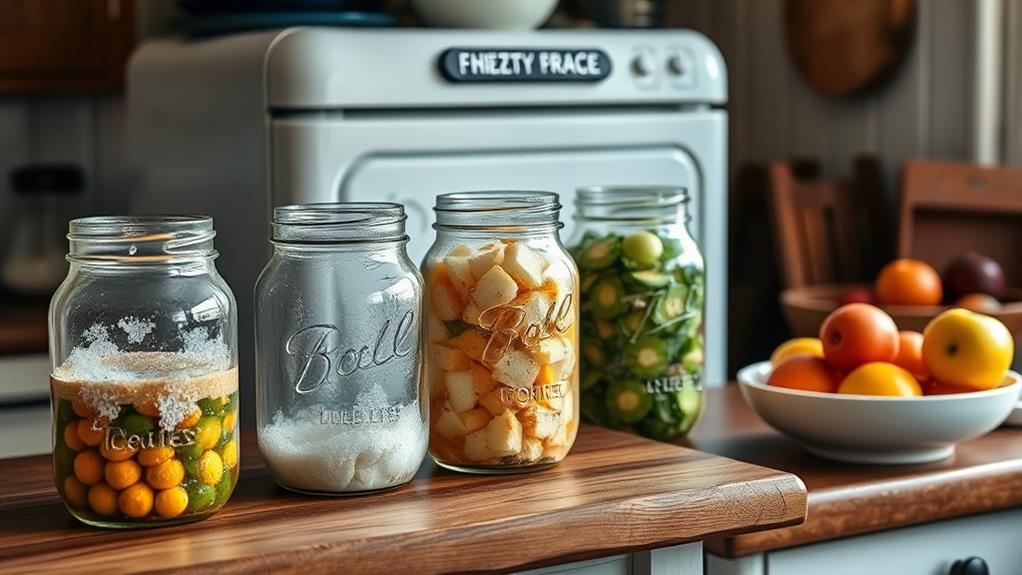
When you're freezing Mason jars, it's crucial to take into account how food expands, so leave enough space at the top.
To guarantee you're managing your kitchen supplies effectively, think about using tools like expense tracking tools to monitor related costs.
Fill your jars just below the collar to prevent cracking, and opt for wide-mouth jars for easier access.
Freezer Expansion Considerations
Freezing food in Mason jars can be a convenient way to preserve your meals, but it's important to contemplate how the contents will expand as they freeze. When you fill your Mason jars, always leave enough headspace—typically just below the collar—to accommodate for freezer expansion. Some jars even have a freeze line marked to help you avoid filling them too much.
Using wide-mouth Mason jars is preferable since they allow for easier removal of frozen contents when you're ready to use them.
Remember, though, that while Mason jars are generally freezer-safe, they aren't microwave-safe for thawing. Rapid temperature changes can lead to shattering, so it's best to avoid thawing frozen jars in the microwave.
To maintain the integrity of your jars during freezing, consider using plastic caps for sealing wide-mouth jars, ensuring food safety and reducing the risk of breakage.
Recommended Fill Levels
To guarantee your Mason jars withstand the freezing process, it's important to fill them correctly. When freezing, the recommended fill levels are just below the collar of the jar. This space is vital because it allows for the expansion of liquids during freezing, preventing potential breakage.
If you overfill your jars, the pressure from the expanding food can lead to cracks or shattering. Some Mason jars come with a freeze line that indicates the maximum fill level. Always adhere to this line to verify safety.
Leaving enough space at the top is essential not just for expansion, but also to maintain the integrity of your microwave-safe Mason jars when you eventually use them. Before you freeze, consult specific guidelines on freezing food in Mason jars for best practices. This will further verify you're taking the right precautions.
Thawing Methods to Avoid
Many people mistakenly think it's safe to thaw frozen Mason jars in the microwave, but this can lead to dangerous results. The rapid temperature changes from microwave heating can cause the glass to crack or even shatter, posing a serious safety risk. Instead, you should transfer the contents of your frozen Mason jars to a microwave-safe container before heating.
Another method to avoid is exposing frozen Mason jars to boiling water immediately. Doing so can also result in breakage, as the glass needs to acclimate to room temperature first.
Always leave adequate space at the top of your Mason jars when freezing food. This allows for food expansion and helps maintain jar integrity, reducing the risk of cracking.
To guarantee the safety and longevity of your Mason jars, consult best practices for freezing food in them. Taking these precautions will help you avoid common thawing mistakes and keep your kitchen safe and efficient.
Addressing Common Concerns
When it comes to using Mason jars in the microwave, safety concerns often arise. Most Mason jars, such as Ball® brands, aren't microwave-safe due to being made from annealed glass, which can break under uneven heating.
To enhance your financial management, consider using apps that send automated bill payment notifications, such as timely reminders. Here are some common concerns you should keep in mind:
- Avoid Frozen Jars: Never microwave frozen Mason jars as they can shatter from rapid temperature changes.
- Remove Metal Lids: Always take off metal lids before microwaving to prevent dangerous explosions.
- Limit Heating Time: Even if newer jars have a microwave-safe symbol, stick to the general rule of heating for under five minutes to minimize risks.
- Let Them Cool: Allow jars to cool before opening to avoid burns from steam.
If you're looking for safer options, consider transferring food to microwave-safe containers made of glass or ceramic.
Conclusion
In summary, while many mason jars are microwave safe, it's essential to check for any labels or guidelines. Did you know that about 70% of households use mason jars for storage? This popularity highlights the significance of understanding how to use them properly. By following best practices and being aware of potential risks, you can enjoy the convenience of microwaving without worry. Remember, safety first guarantees you can keep using your favorite jars for years to come!

